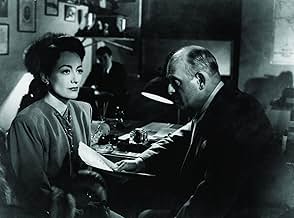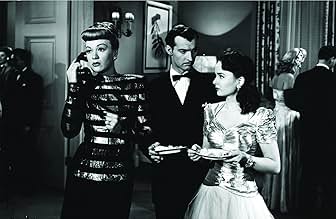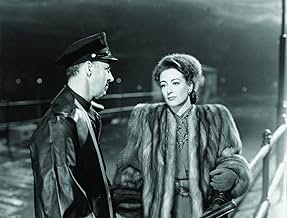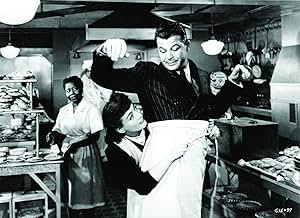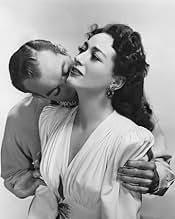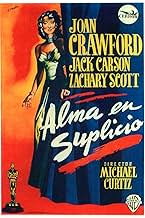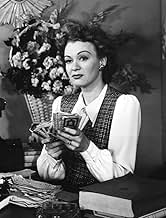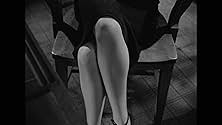AVALIAÇÃO DA IMDb
7,9/10
30 mil
SUA AVALIAÇÃO
Principal suspeita da morte do marido, Mildred Pierce conta o seu passado num depoimento policial. Do primeiro casamento ao relacionamento com as filhas e à forma como enriqueceu, revela o s... Ler tudoPrincipal suspeita da morte do marido, Mildred Pierce conta o seu passado num depoimento policial. Do primeiro casamento ao relacionamento com as filhas e à forma como enriqueceu, revela o suplício pelo que passou.Principal suspeita da morte do marido, Mildred Pierce conta o seu passado num depoimento policial. Do primeiro casamento ao relacionamento com as filhas e à forma como enriqueceu, revela o suplício pelo que passou.
- Direção
- Roteiristas
- Artistas
- Ganhou 1 Oscar
- 3 vitórias e 7 indicações no total
Bill Alcorn
- Soldier
- (não creditado)
Betty Alexander
- Party Guest
- (não creditado)
Ramsay Ames
- Party Guest
- (não creditado)
George Anderson
- Peterson's Assistant
- (não creditado)
James Anderson
- Diner Customer
- (não creditado)
Robert Arthur
- High School Boy
- (não creditado)
Lynn Baggett
- Waitress
- (não creditado)
Leah Baird
- Police Matron
- (não creditado)
Resumo
Reviewers say 'Mildred Pierce' is acclaimed for its strong female lead, complex dynamics, and themes of maternal love and social class. Joan Crawford's Oscar-winning performance is celebrated, and the film's noir elements are noted. However, some find the pacing slow and melodrama excessive, with Veda's character criticized. Despite this, it's seen as a classic with significant historical portrayal of women's roles.
Avaliações em destaque
James M Cain's novel 'Mildred Pierce' was much tougher, dirtier, violent and cynical than the gorgeously mounted movie it became, but the film still manages to maintain enough of the flavor of the book to be interesting. The portrait of working class life in Southern California works well, as does the depiction of a marriage that breaks down because of disappointment and resentment rather than anything melodramatic. Within its first hour MILDRED PIERCE captures something anxious about American life and marriages and families that is more true than most of what movies had shown up to that time, and it would prove to be even more so in the postwar world to come. The movie actually becomes more false and synthetic as it moves into Mildred's rise in life, but by then the plot and characters have taken hold.
And so has the film's increasingly bleak look at what women can expect when they live and work alone in a man's world, beset by men who want to exploit them, sexually and otherwise. This too, though softened from the book, would have seemed refreshingly frank to many of viewers at that time.
What raises the film to the level of classic is the first class work from every professional in every department. Joan Crawford is not much more expressive here than she was in her later MGM pictures, but this character suits her limited talents so well that she seems better than in almost anything else she did. All her Warners pictures used her more effectively than MGM usually managed to do, perhaps because in them she is invariably exploited, abused, maligned, even tortured. The bad behavior her Warners characters inspire in others is so extreme that she doesn't need to be. These plots do what Adrian's sometimes garish clothes did for her at MGM: they give her a personality, make her seem more interesting than she really was, and they make her sympathetic despite her essential coldness. Crawford gets able support from Ann Blyth, Eve Arden (as comedy relief; she is almost appearing in another movie entirely), Zachary Scott and especially Jack Carson, dead-on as a sweaty hustler and low rent lothario, bringing nuance to what could have been a one-note portrayal. Bruce Bennett isn't really a good actor in the role of Mildred's first husband, but he's perfectly cast -- he looks like an Okie from one of Dorothea Lange's photographs who went west to 'make it' and never did.
And as has been frequently mentioned here, Ernest Haller's cinematography (especially in the brilliant prints now being shown on cable) is consistently evocative and beautiful. So many of his shots live in the memory: in the scene where a mink wearing, gun wielding Mildred comes upon Monte and Vida kissing, the image is an almost primal one of betrayal and glamor -- the way their profiles are in darkness, the way Ann Blyth arches back against the bar, the hard, dim glitter of lame and the billows of tulle from her gown. The way Vida tumbles forward into almost blinding lamplight while Monte's face hardens behind her -- these are the kinds of wonderful images the best old films regularly delivered. Also excellent is Anton Grot's art direction, opulent but still managing to help create the particular SoCal atmosphere of this picture. And as usual, Max Steiner's score is effective, but as an earlier poster noted, he recycled a couple of motifs from his Oscar-winning score to NOW, VOYAGER. And director Michael Curtiz must be praised for keeping everything in perfect balance. This is one of the most admired '40s pictures and well worth a look.
And so has the film's increasingly bleak look at what women can expect when they live and work alone in a man's world, beset by men who want to exploit them, sexually and otherwise. This too, though softened from the book, would have seemed refreshingly frank to many of viewers at that time.
What raises the film to the level of classic is the first class work from every professional in every department. Joan Crawford is not much more expressive here than she was in her later MGM pictures, but this character suits her limited talents so well that she seems better than in almost anything else she did. All her Warners pictures used her more effectively than MGM usually managed to do, perhaps because in them she is invariably exploited, abused, maligned, even tortured. The bad behavior her Warners characters inspire in others is so extreme that she doesn't need to be. These plots do what Adrian's sometimes garish clothes did for her at MGM: they give her a personality, make her seem more interesting than she really was, and they make her sympathetic despite her essential coldness. Crawford gets able support from Ann Blyth, Eve Arden (as comedy relief; she is almost appearing in another movie entirely), Zachary Scott and especially Jack Carson, dead-on as a sweaty hustler and low rent lothario, bringing nuance to what could have been a one-note portrayal. Bruce Bennett isn't really a good actor in the role of Mildred's first husband, but he's perfectly cast -- he looks like an Okie from one of Dorothea Lange's photographs who went west to 'make it' and never did.
And as has been frequently mentioned here, Ernest Haller's cinematography (especially in the brilliant prints now being shown on cable) is consistently evocative and beautiful. So many of his shots live in the memory: in the scene where a mink wearing, gun wielding Mildred comes upon Monte and Vida kissing, the image is an almost primal one of betrayal and glamor -- the way their profiles are in darkness, the way Ann Blyth arches back against the bar, the hard, dim glitter of lame and the billows of tulle from her gown. The way Vida tumbles forward into almost blinding lamplight while Monte's face hardens behind her -- these are the kinds of wonderful images the best old films regularly delivered. Also excellent is Anton Grot's art direction, opulent but still managing to help create the particular SoCal atmosphere of this picture. And as usual, Max Steiner's score is effective, but as an earlier poster noted, he recycled a couple of motifs from his Oscar-winning score to NOW, VOYAGER. And director Michael Curtiz must be praised for keeping everything in perfect balance. This is one of the most admired '40s pictures and well worth a look.
Six shots fired and a man falls down dead. Shortly thereafter, we meet a desperate Mildred Pierce who walks along the streets of the night. After a policeman prevented her from jumping into the river, she ends up at a bar where an old acquaintance flirts uncontrollably. They go to her house on the beach, from Mildred suddenly quickly departs. It turns out that it was in this house that the man was shot and soon the police on the spot. During interrogation begins the story of what led up to that fateful night. Mildred tells how she differs from her husband, working upward as a business woman and how she is willing to do absolutely everything to their already spoiled daughter Veda.
Mildred Pierce literally sparkles. Director Michael Curtiz, probably best known for Casablanca, knows how to get the luxurious feel of a grand noir drama. Elegant small transitions, meticulous and dramatic lighting applications, all in classic Hollywood manner, where nothing is left to chance.
The dialog is fabulous. Mildred's right hand Ida is so cool, with the hatching of witty one-liners. Even the ever-swarming Wally Fay is constantly exciting to listen to.
The story in itself is exciting, where you always know roughly how it will end, but not why or what role some of the characters will play. The characters are the driving force. It's about Mildred's efforts to give their daughters the life she had wanted, although it also means she does not listen to what they really want. Then there is a former spouse who is living his new life in the periphery, the friend who is helpful, but not without being sure to reap the rewards of Mildred's success and even a new one that might not be what he appears to be.
Crawford got a well-deserved Oscar for this film.
Mildred Pierce literally sparkles. Director Michael Curtiz, probably best known for Casablanca, knows how to get the luxurious feel of a grand noir drama. Elegant small transitions, meticulous and dramatic lighting applications, all in classic Hollywood manner, where nothing is left to chance.
The dialog is fabulous. Mildred's right hand Ida is so cool, with the hatching of witty one-liners. Even the ever-swarming Wally Fay is constantly exciting to listen to.
The story in itself is exciting, where you always know roughly how it will end, but not why or what role some of the characters will play. The characters are the driving force. It's about Mildred's efforts to give their daughters the life she had wanted, although it also means she does not listen to what they really want. Then there is a former spouse who is living his new life in the periphery, the friend who is helpful, but not without being sure to reap the rewards of Mildred's success and even a new one that might not be what he appears to be.
Crawford got a well-deserved Oscar for this film.
Joan Crawford's tour-de-force as a self-sacrificing mother is a real stunner. Directed by Michael Curtiz, and based on James M.Cain's steamy novel, "Mildred Pierce" is a slick stylish sudser that ranks among the best.
After a decade-long streak at MGM, Crawford, made her way over to Warner Bros. It was a brilliant move as Crawford won an Oscar (as Mildred) and ended up back on top.
As the title character, Crawford brings a sense of steely determination and guts. As a devoted housewife, Mildred puts the needs of her family first. So when her husband (Bruce Bennett) begins a sleazy affair with a woman down the street, Mildred kicks him out and starts life anew. Nothing - not even one daughter's death and another daughter's selfishness - stops Mildred from working her way to the top. She goes from waitress in a greasy diner to the wealthy owner of a successful restaurant chain. But despite her achievements, Mildred must contend with a slimy lover (Zachary Scott) and her increasingly vile and spoiled daughter, Veda (Ann Blyth). All the drama comes to a rousing climax, which culminates in a physical altercation between brat and mom.
Crawford's gut-wrenchingly sympathetic performance draws you in, and the sparks that she and the wonderful Blyth create are unforgettable. Also, a playful Eve Arden as Mildred's pal, spouts off some terrific dialogue.
"Mildred Pierce" is an exceptional piece of work that uses some of the finest elements of classic cinema. The story moves along at a sleek pace, and thanks to the writers, "Mildred" never sinks in the froth of its own soapiness. A powerful, emotional cinematic experience.
After a decade-long streak at MGM, Crawford, made her way over to Warner Bros. It was a brilliant move as Crawford won an Oscar (as Mildred) and ended up back on top.
As the title character, Crawford brings a sense of steely determination and guts. As a devoted housewife, Mildred puts the needs of her family first. So when her husband (Bruce Bennett) begins a sleazy affair with a woman down the street, Mildred kicks him out and starts life anew. Nothing - not even one daughter's death and another daughter's selfishness - stops Mildred from working her way to the top. She goes from waitress in a greasy diner to the wealthy owner of a successful restaurant chain. But despite her achievements, Mildred must contend with a slimy lover (Zachary Scott) and her increasingly vile and spoiled daughter, Veda (Ann Blyth). All the drama comes to a rousing climax, which culminates in a physical altercation between brat and mom.
Crawford's gut-wrenchingly sympathetic performance draws you in, and the sparks that she and the wonderful Blyth create are unforgettable. Also, a playful Eve Arden as Mildred's pal, spouts off some terrific dialogue.
"Mildred Pierce" is an exceptional piece of work that uses some of the finest elements of classic cinema. The story moves along at a sleek pace, and thanks to the writers, "Mildred" never sinks in the froth of its own soapiness. A powerful, emotional cinematic experience.
The characterization of film noire is applied to certain films that touch on the grittier, more cynical aspects of life. This genre is typified as having lead roles played by strong, solemn male characters, in this respect, Mildred Pierce is an exception. In all other ways Mildred Pierce follows the model for a great film noire. The main character encounters both success and crushing emotional hardships, which the viewer gets to see the effects of. The supporting characters do a wonderful job depicting deceit in action, and each individual character contributes moving specific parts of the film along. The film ends with somewhat of an untied knot, and the viewer could certainly learn to love Mildred as the epitome of a "tragic hero". The film starts with a mystery and works it's way backwards, and as you can assume the viewer imagines he/she knows what is going on, when clearly the writer has us at his whims. Great acting. Great tragedy. Great film noire.
The story that unfolds in Mildred Pierce is complicated and dark, and at its darkest, is a chilling portrait of a mother so devoted to her children (well, child, really) that she would go to any and all lengths for them. Although some of the situations and scenes suffer from the passage of time (the modern audience in the cinema, myself included, couldn't help laughing at some of the more ludicrous things said/done), the film as a whole worked, mostly on the strength of the performances.
Joan Crawford won her only Oscar for her role, and it was well-deserved--she held the film together with a confident performance that ranged from charming and sassy, to desperate and almost frightening. The final scenes of the film, especially, captured Mildred at her most pathetic, and Crawford looked utterly despondent in the telephone scene. Ann Blyth is utterly convincing as the spoilt, deeply disturbed Veda, narcissistic and unrelentingly manipulative of her mother. And the best supporting performance had to come from Eve Arden, who played Mildred's friend Ida--Arden saunters across the screen, stealing scenes left and right, before disappearing from view again. She was excellent!
The film is well worth the watch--not brilliant, but definitely very good. I also like the story-telling technique and the direction (the director made quite clever and frequent use of shadows and mirrors), and it's good that the darkness and melodrama was frequently mitigated by the well-written dialogue. 8/10.
Joan Crawford won her only Oscar for her role, and it was well-deserved--she held the film together with a confident performance that ranged from charming and sassy, to desperate and almost frightening. The final scenes of the film, especially, captured Mildred at her most pathetic, and Crawford looked utterly despondent in the telephone scene. Ann Blyth is utterly convincing as the spoilt, deeply disturbed Veda, narcissistic and unrelentingly manipulative of her mother. And the best supporting performance had to come from Eve Arden, who played Mildred's friend Ida--Arden saunters across the screen, stealing scenes left and right, before disappearing from view again. She was excellent!
The film is well worth the watch--not brilliant, but definitely very good. I also like the story-telling technique and the direction (the director made quite clever and frequent use of shadows and mirrors), and it's good that the darkness and melodrama was frequently mitigated by the well-written dialogue. 8/10.
Você sabia?
- CuriosidadesAfter seeing the film, James M. Cain sent Joan Crawford a signed first edition of the original novel. The inscription read: "To Joan Crawford, who brought Mildred Pierce to life just as I had always hoped she would be, and who has my lifelong gratitude."
- Erros de gravaçãoMildred's house on Corvallis Street in Glendale is shown as a one-story Spanish-style bungalow; however, the interior has a staircase leading to the bedrooms.
- Citações
Ida Corwin: [to Wally about his lustful looks in her direction] Leave something on me. I might catch cold.
- Cenas durante ou pós-créditosThe opening credits are presented with a background ocean scene that "washes" the credits on the screen.
- Versões alternativasAlso shown in computer colorized version.
- ConexõesFeatured in Hollywood: The Fabulous Era (1962)
- Trilhas sonorasYou Must Have Been a Beautiful Baby
(uncredited)
Music by Harry Warren
Lyrics by Johnny Mercer
Played and sung at Wally's club toward the beginning
Also played when Veda and Ted are at Wally's club
Principais escolhas
Faça login para avaliar e ver a lista de recomendações personalizadas
- How long is Mildred Pierce?Fornecido pela Alexa
Detalhes
- Data de lançamento
- País de origem
- Idiomas
- Também conhecido como
- El suplicio de una madre
- Locações de filme
- Empresa de produção
- Consulte mais créditos da empresa na IMDbPro
Bilheteria
- Orçamento
- US$ 1.453.000 (estimativa)
- Faturamento bruto mundial
- US$ 11.751
- Tempo de duração1 hora 51 minutos
- Cor
- Proporção
- 1.37 : 1
Contribua para esta página
Sugerir uma alteração ou adicionar conteúdo ausente





